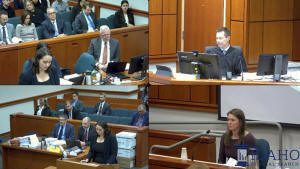Women suing over Idaho's abortion ban describe dangerous pregnancies,
becoming 'medical refugees'
 Send a link to a friend
Send a link to a friend
 [November 13, 2024]
By REBECCA BOONE [November 13, 2024]
By REBECCA BOONE
BOISE, Idaho (AP) — Four women suing over Idaho's strict abortion bans
told a judge Tuesday how excitement over their pregnancies turned to
grief and fear after they learned their fetuses were not likely to
survive to birth — and how they had to leave the state to get abortions
amid fears that pregnancy complications would put their own health in
danger.
“We felt like we were being made refugees, medical refugees,” said
Jennifer Adkins, one of the plaintiffs in the case.
The women, represented by the Center for Reproductive Rights, aren't
asking for the state's abortion ban to be overturned. Instead, they want
the judge to clarify and expand the exceptions to the strict ban so that
people facing serious pregnancy complications can receive abortions
before they are at death's door.
Currently, the state's near-total ban makes performing an abortion a
felony at any stage of pregnancy unless it is “necessary to prevent the
death of the pregnant woman.”
Adkins' fetus had a severe medical condition that meant it would not
survive the pregnancy. The illness also put Adkins at risk of developing
“mirror syndrome,” a dangerous syndrome that can cause fatally high
blood pressure and other issues, she said.
Adkins and her husband decided to seek an abortion, and learned they
would have to go out of state to get one after another ultrasound showed
the fetus still had a heartbeat.
“No parent wants to wish that when they look at an ultrasound they don't
see their baby's heartbeat, yet here I was hoping that I wouldn't,”
Adkins said. “I wanted the decision to be made for us, and I wanted to
end her suffering, so it was really hard to see that and know that we
had the challenges ahead of us that we did.”

Kayla Smith cried as she told the judge how she found out she was
pregnant for a second time on Mother's Day of 2022, and how she and her
husband chose the name “Brooks” for their son. She was around 18 or 20
weeks along in her pregnancy when the sonographer grew quiet during a
routine anatomy scan, Smith said.
Brooks' heart had fatal anomalies, and the young family could not find a
pediatric cardiologist willing to attempt an operation. The veins
supplying Brooks' lungs were also abnormal, Smith said, and he would not
survive birth.
Smith had developed dangerously high blood pressure during a previous
pregnancy, and she was at risk of developing the condition called
preeclampsia again.
“If I were to continue pregnancy not only would I risk my life with
preeclampsia, I was not willing to watch my son suffer and potentially
gasp for air,” Smith said, crying.
Idaho's abortion ban went into effect two days before Brooks' diagnosis,
she said, making it impossible for her to get an abortion in her home
state.
“We wanted to meet our son — that was really important to us — so we
needed to do it in a hospital,” she said. They took out a loan to cover
the estimated $16,000 to $20,000 out-of-network cost and drove more than
eight hours to a hospital where doctors induced labor.
[to top of second column]
|

In this image taken from a video provided by Idaho Fourth District
Court, Rebecca Vincen-Brown, lower right, tears up as she testifies
in court about her abortion, Tuesday, Nov. 12, 2024, in Boise,
Idaho. (Idaho Fourth District Court via AP)
 “All four of these women were
overjoyed to be pregnant with their second child and all four of
them received the worst news a mother can imagine,” attorney Gail
Deady, with the Center for Reproductive Rights, told 4th District
Judge Jason D. Scott during opening arguments. All of them sought
abortions “to protect their health, to spare their babies from pain
and suffering, and to remain alive and healthy to protect their
young children.”
James Craig, a division chief with the Idaho
Attorney General’s office, said the women and their attorneys are
relying on hypotheticals rather than concrete facts to make their
case. Under their proposal, a pregnant woman could receive her
abortion for something as minor as stepping on a rusty nail — even
though the risk of infection in that scenario could be easily
treated by receiving a tetanus booster shot, Craig said.
“Unborn children have a fundamental right to life, and protecting
the lives of children is a legitimate and fundamental government
interest,” Craig said.
The state also has the same interest in protecting the lives of
women, Craig said — and the abortion ban laws do both, he contended.
In the “rare circumstances where abortion is necessary” to prevent
the death of the mother, Idaho law allows that to occur, Craig said.
The women suing are trying to “usurp the role of the Legislature” by
asking the judge to rewrite the law, he said, and that is not the
proper role of the court.
Dr. Emily Corrigan, an ob-gyn who works in emergency medicine at
Saint Alphonsus Regional Medical Center who is also a plaintiff in
the case, told the judge how Idaho’s multiple abortion bans have
created confusion for physicians and made it difficult to treat
pregnant patients who need emergency care.
Doctors have had to “basically guess which pregnancy conditions
would fall under the state medical exception,” Corrigan said.
“I have had other hospital staff refuse to participate in the care
of my patients because of the lack of understanding of the laws, and
this has caused patient care delays,” she said. “I have personally
cared for several patients who have been denied stabilizing abortion
care at other hospitals in Idaho. By the time they arrive at my
institution, their conditions have deteriorated and have lead to
increased complications that I need to manage.”
Several conditions can put the health of pregnant people at risk,
she said. Some are caused by pregnancy like preeclampsia, and others
— including some chronic illnesses and cancers — can be made worse
by pregnancy, she said. In those cases, delaying an abortion might
not cause immediate death but can cause a shortened life span or
have dramatic effects on a person's health, Corrigan said.
“We are not trained to wait until things become urgent or emergent.
We are trained to prevent harm to our patients,” she said.
All contents © copyright 2024 Associated Press. All rights reserved |